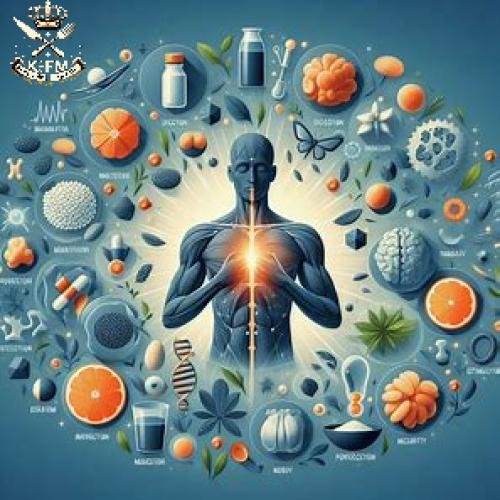Obesity is a health condition that describes an excessive increase in body weight due to abnormal fat accumulation. Obesity is one of the major health challenges faced by many individuals around the world, and it is closely associated with unhealthy dietary habits. Diets rich in saturated fats, sugars, and processed foods are key factors that contribute to excessive weight gain. In addition, a sedentary lifestyle and lack of physical activity increase the risk of obesity. In this context, proper nutrition and awareness of food quality are among the most important factors that help in the prevention and treatment of obesity.
The Concept of Obesity and Its Causes:
Obesity is an increase in the fat layer beneath the skin and throughout the body. A person is considered obese if their weight exceeds 15% of the average weight for someone of the same height and age. For example, if a person is 175 cm tall, their weight should be around 75 kilograms. If it exceeds this limit and reaches 85 kilograms, they are considered obese.
Causes of Obesity:
Obesity has become widespread due to several factors, including an increase in the consumption of starchy and sugary foods, lack of movement and activity, prolonged sitting, a sedentary lifestyle, poor sitting habits, laziness, sluggishness, and overconsumption of sugary and alcoholic beverages. Additionally, focusing on preparing food in a way that increases its appeal and encourages excessive consumption also contributes to obesity.

The Harmful Effects of Obesity: The harms of obesity are not limited to the external appearance and physical appearance; they extend to negative effects on the heart, kidneys, respiratory system, liver, and the person's general condition, including laziness, sluggishness, and constant fatigue. However, a healthy diet can play a positive role in treating and improving this condition.
Treatment of Obesity: The treatment of obesity relies on three basic conditions: completely avoiding certain foods, regularly consuming specific foods, and adhering to healthy rules. Foods that should be completely avoided include: pastries, dry legumes, sugary fruits, chocolate, honey, jam, sweets, qatayef (stuffed pancakes), soft drinks, and alcoholic beverages. On the other hand, low-fat red meats, non-fat fish, cheeses, butter, ghee, vegetable oils, skim milk, skinless poultry meat, oily fruits like walnuts, almonds, and hazelnuts, fresh fruits, vegetables of all kinds, drinks such as coffee and tea without sugar, reducing salt intake, and maintaining a balanced water intake are all recommended.

Healthy Rules: A person suffering from obesity should follow healthy rules as much as possible, such as engaging in different types of movement and exercise, reducing sleeping hours, practicing fasting, and avoiding prolonged sitting.
Frequently Asked Questions:
Do genetics play a role in obesity?
Yes, genetics plays a major role in obesity as genes can affect how the body stores fat and its metabolic rate. If one of the parents is obese, the likelihood of the children being obese increases.
How do hormones affect obesity?
Hormones like insulin, leptin, ghrelin, and cortisol directly affect appetite and fat storage. For example, insulin resistance can lead to fat accumulation in the body.
What are the most dangerous types of obesity?
Obesity that is concentrated around the abdomen (visceral obesity) is considered the most dangerous, as it is linked to heart diseases, type 2 diabetes, and high blood pressure.
Is there localized obesity?
Yes, localized obesity refers to fat accumulation in specific areas of the body, such as the abdomen, thighs, or arms. This can be reduced through targeted exercises and healthy eating.
What is the relationship between obesity and metabolism?
Metabolism refers to the rate at which the body burns calories. People with a low metabolic rate are more prone to weight gain, especially if they are inactive.
Should sugary fruits be completely avoided?
Not necessarily. Fruits contain natural sugars and beneficial fiber, and can be eaten in moderation as part of a healthy diet. It’s best to choose fruits with a low glycemic index, like apples, pears, and berries.
Are butter, ghee, and vegetable oils allowed?
Some oils, like olive oil and coconut oil, are considered healthy when used in moderation. Ghee and butter should be consumed in smaller amounts due to their saturated fat content.
What’s the difference between simple and complex carbohydrates?
Simple carbohydrates: These include refined sugars (like sweets and white bread) and cause a quick rise in blood sugar levels.
Complex carbohydrates: These include whole grains, vegetables, and legumes, and are digested slowly, helping to keep you feeling full longer.
What is the best diet for weight loss?
A healthy diet includes:
- Lean proteins (like chicken, fish, and legumes).
- Reduced refined sugars and carbohydrates.
- Moderation in healthy fats.
- Increased consumption of fruits and vegetables.
- Adequate water intake.
Does drinking water before meals help with weight loss?
Yes, drinking water before meals helps reduce hunger, leading to a decrease in calorie intake.
What are the best exercises for burning fat?
- Brisk walking: Helps burn fat without stressing the body.
- Strength training: Like weightlifting, it helps build muscles and boost metabolism.
- Aerobic exercises: Like running, cycling, and jump rope are very effective for weight loss.
Can obesity be reduced without exercise?
Yes, but weight loss will be slower. Calorie intake can be controlled through diet, but exercise helps burn more fat and improves overall health.
How does obesity affect mental health?
Obesity can lead to lower self-esteem, depression, and anxiety due to social and health pressures. It’s important to support people suffering from obesity mentally, alongside providing practical solutions for weight loss.
Summary
Obesity is a complex health issue influenced by multiple factors, including eating habits, physical activity, genetics, and hormones. It can be controlled through a healthy diet, regular exercise, and adequate water intake. Answering common questions related to obesity helps educate individuals and empower them to make healthier decisions for their lives.




















